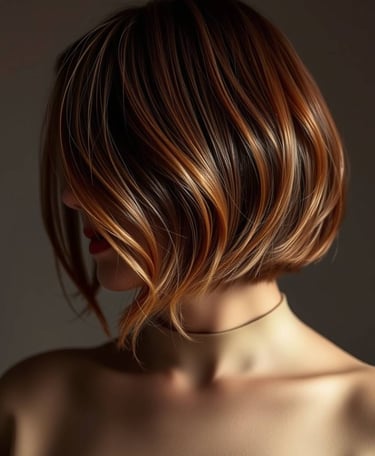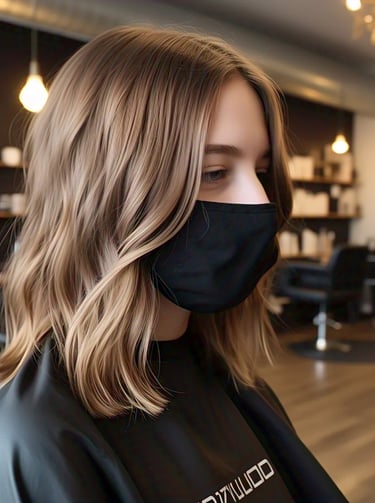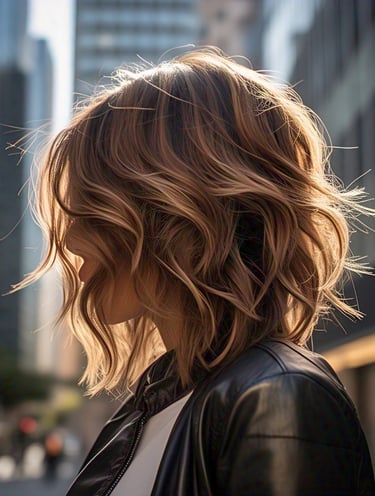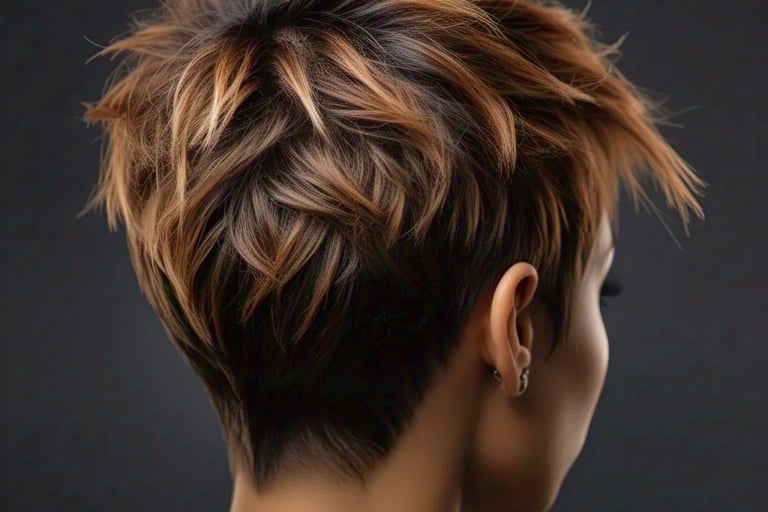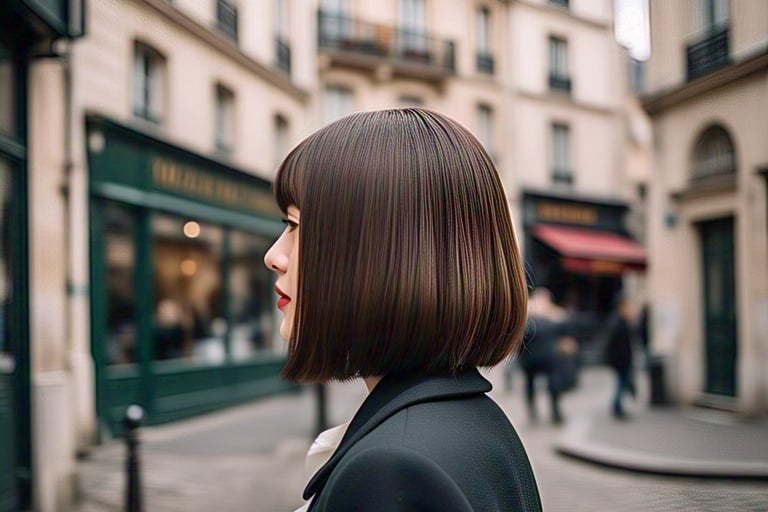Not sure whether to go for a lob or a bob? This 2025 guide breaks it all down.
Confused between a lob vs. bob hairstyle? Discover key differences, similarities, top styles, and which one suits you best. Get expert tips to choose your perfect cut!
BOB CUT
5/10/20259 min read
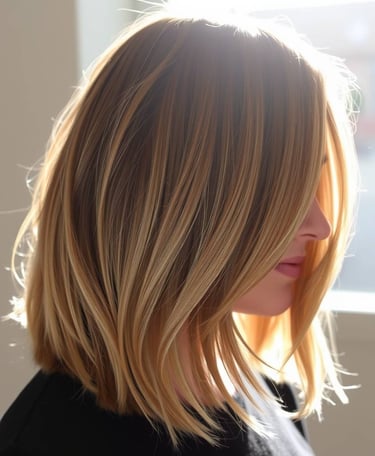

In the ever-evolving world of hair fashion, few styles have demonstrated the staying power and versatility of the bob and lob (long bob) hairstyles. These iconic cuts have graced the heads of fashion icons, celebrities, and everyday trendsetters for decades, constantly reinventing themselves while maintaining their timeless appeal.
Whether you're scrolling through social media, flipping through magazines, or people-watching at your favorite café, you'll notice these chic, versatile cuts everywhere—and for good reason. They frame the face beautifully, suit various hair textures, and offer that perfect balance between low-maintenance care and high-impact style.
But when it comes to choosing between a bob and a lob, many people find themselves at a crossroads. Which style will better complement your face shape? Which one aligns with your lifestyle and styling preferences? And what exactly separates these two beloved hairstyles?
In this comprehensive guide, we'll explore everything you need to know about bob and lob hairstyles—from their defining characteristics and historical evolution to personalized recommendations based on your unique features and lifestyle needs. By the end, you'll be equipped with expert knowledge to confidently choose the perfect cut for your next salon visit.
Understanding the Basics: What Exactly Are Bob and Lob Hairstyles?
The Classic Bob: A Brief History
The bob hairstyle has a rich history dating back to the early 20th century when it emerged as a symbol of women's liberation and modernity. In the 1920s, the flapper bob revolutionized women's hair, breaking away from the long, elaborate styles that had dominated previous eras.
A traditional bob is characterized by hair cut straight around the head at about jaw-level, often with bangs at the front. Over the decades, this foundational cut has spawned countless variations, from the sharp precision of Vidal Sassoon's geometric bobs in the 1960s to the layered, textured bobs popular today.
The Lob (Long Bob): The Modern Classic
The lob—or long bob—emerged as a softer alternative to the traditional bob, offering the structure and style of its shorter counterpart while maintaining more length and versatility. This shoulder-grazing cut gained significant popularity in the early 2010s and has remained a staple in hair fashion ever since.
The lob typically falls somewhere between the chin and the collarbone, offering the perfect middle ground for those hesitant to commit to a shorter cut but craving a change from long locks. Its versatility makes it particularly appealing across various age groups and lifestyles.
Lob vs. Bob: Key Differences Explored
1. Length: The Defining Factor
The most obvious distinction between these two styles lies in their length:
Bob: Typically falls between chin and jaw-length, with classic bobs ending right at the jawline. Mini or pixie bobs can be even shorter, while longer variations may brush the bottom of the ears.
Lob: Ranges from just below the chin to collarbone-length, offering a longer silhouette that frames the neck and upper chest area.
The difference in length might seem subtle—sometimes just a matter of a few inches—but it dramatically affects how the hairstyle looks, feels, and functions in everyday life.
2. Styling Versatility and Options
The length variance between bobs and lobs creates significant differences in styling potential:
Bob Styling Options:
More structured and architectural
Excellent for showcasing sharp, blunt lines
Perfect for sleek, polished looks
Creates dramatic statements with minimal styling
Works beautifully with precise cutting techniques like undercuts or asymmetrical designs
Lob Styling Options:
Greater flexibility for various styling techniques
Can be tied back into small ponytails or half-up styles
Exceptional canvas for beach waves and tousled textures
Allows for more dramatic curls without creating excessive volume
Easier to transition between straight and wavy looks
3. Face Shape Compatibility
While both styles can be adapted to suit almost any face shape with the right customization, they naturally complement different facial structures:
Bob Face Shape Affinity:
Oval faces: The classic bob showcases this balanced face shape beautifully
Heart-shaped faces: Emphasizes cheekbones while softening a pointed chin
Square faces: Can accentuate strong jawlines (which may be desired) or be softened with layers
Diamond faces: Highlights the cheekbones and balances narrow foreheads and chins
Lob Face Shape Affinity:
Round faces: The additional length creates elongating lines that slim fuller face shapes
Long faces: Mid-length cuts break up the vertical lines of longer face shapes
Pear-shaped faces: Balances narrower foreheads with wider jawlines
Rectangle faces: Softens angular features with movement and dimension
4. Maintenance Requirements
The commitment level varies significantly between these two cuts:
Bob Maintenance:
Requires regular trims every 4-6 weeks to maintain the precise shape
Growing out phase can be awkward, with noticeable transitional stages
May require more daily styling to maintain the structured look
Often needs specific styling products to control shape and movement
Lob Maintenance:
More forgiving growth pattern, requiring trims every 8-10 weeks
Transitions more gracefully between styles as it grows
Typically requires less daily styling intervention
Works well with a wider range of styling approaches, from polished to undone
5. Hair Texture Considerations
Different hair textures interact uniquely with bob and lob cuts:
For Straight Hair:
Bobs highlight the sleekness and shine of straight hair, creating sharp lines
Lobs allow straight hair to move and swing naturally while maintaining structure
For Wavy Hair:
Bobs can enhance natural waves, creating voluminous, bouncy shapes
Lobs showcase the natural undulation of waves beautifully, with weight maintaining control
For Curly Hair:
Bobs can create more volume and "triangle" shapes if not properly layered
Lobs distribute volume more evenly, allowing curls to fall naturally while retaining length
Similarities: What Unites These Popular Styles
Despite their differences, bobs and lobs share several appealing characteristics:
1. Timeless Versatility
Both styles have demonstrated remarkable staying power in the fashion world, continuously reinventing themselves while maintaining their essential appeal. They work across generational lines, looking equally appropriate on young professionals, busy parents, and elegant seniors.
2. Transformative Power
Few haircuts can transform a person's look as dramatically as bob and lob styles. Both cuts frame the face in ways that highlight features, create definition, and refresh the overall appearance without requiring extreme measures like dramatic color changes.
3. Customization Potential
Both styles serve as excellent base cuts that can be personalized through:
Various bangs styles (curtain, side-swept, blunt, wispy)
Texturizing techniques (layers, point cutting, razor work)
Color enhancement (balayage, highlights, ombré effects)
Undercuts and hidden details
4. Styling Efficiency
Compared to longer hairstyles, both bobs and lobs offer relatively quick styling times. Their structured nature means they often fall naturally into place with minimal effort, making them ideal for busy lifestyles.
How to Definitively Identify Each Style
When browsing inspiration photos or discussing options with your stylist, use these visual cues to distinguish between bobs and lobs:
Visual Indicators of a Bob:
Falls at or above the jawline (though some longer bobs may reach the bottom of the ears)
Creates a more geometric silhouette
Often features a more pronounced angle from back to front
Typically showcases the nape of the neck
Usually cannot be pulled back entirely into even a small ponytail
Visual Indicators of a Lob:
Extends past the jawline, typically reaching the collarbones
Creates a softer, more elongated silhouette
Often features a less dramatic angle from back to front
Covers the nape of the neck
Can usually be gathered into a small ponytail or half-up style
Finding Your Perfect Match: Bob or Lob?
Lifestyle Considerations
Beyond aesthetics, your daily routine should heavily influence your choice:
Choose a Bob if:
You prefer minimalist, low-maintenance morning routines
You enjoy making bold fashion statements
You don't mind regular salon visits for maintenance
You're comfortable using styling tools for daily touchups
You want a dramatic change from longer hair
Choose a Lob if:
You need the option to pull hair back occasionally
You prefer versatility in styling options
You want a lower-commitment entry point to shorter hair
You have limited time for salon maintenance visits
You prefer a softer transition from longer hair
Professional Environment Factors
Your workplace culture may influence which style feels more appropriate:
Conservative Professional Environments:
Structured, classic bobs project polish and professionalism
Collarbone-length lobs offer traditional appeal with modern sensibility
Creative Professional Environments:
Textured, asymmetrical bobs showcase artistic personality
Tousled, beach-wave lobs blend professionalism with creative flair
Hair Density and Volume
Your natural hair characteristics should guide your decision:
For Fine Hair:
Blunt bobs create the appearance of thickness and density
Textured lobs with light layers add movement without sacrificing volume
For Thick Hair:
Layered bobs remove bulk and create manageable shapes
Longer lobs distribute weight to prevent excessive volume at the sides
Top 7 Bob Hairstyles Trending in 2025
1. The French Bob
The quintessential Parisian-inspired cut falling at chin-length, often paired with brow-skimming bangs for that effortlessly chic European aesthetic. This style works beautifully with natural texture and minimal styling.
2. The Asymmetrical Bob
Featuring a dramatic length difference from one side to the other, this bold choice offers edge and sophistication simultaneously. The longer side typically sweeps across the face, creating a flattering frame.
3. The Textured Micro Bob
Ultra-short but full of personality, this cropped style uses point cutting and texturizing techniques to create piece-y definition perfect for those seeking maximum impact with minimal length.
4. The Stacked Bob
Graduated shorter at the back with built-in volume, this architectural cut creates fullness and movement while maintaining a clean silhouette. Particularly flattering for fine hair types.
5. The Blunt Bob with Curtain Bangs
Combining the precision of a one-length, blunt-cut bob with the softness of center-parted curtain bangs creates an appealing contrast that frames the face beautifully.
6. The Undercut Bob
Featuring hidden undercut sections at the nape or sides, this style reduces bulk in thick hair while adding an element of surprise when hair is tucked behind the ears or styled up.
7. The Choppy, Layered Bob
Incorporating varied lengths throughout creates movement, texture, and personalized shape that works exceptionally well with natural waves and curls.
Top 7 Lob Hairstyles Dominating 2025
1. The Collarbone-Grazing Blunt Lob
Clean, sharp ends cut precisely at collarbone length create a sophisticated, modern look that swings beautifully with movement and pairs wonderfully with center parts.
2. The Shaggy, Layered Lob
Incorporating '70s-inspired layers throughout, this textured cut creates volume at the crown while maintaining length around the face for a rock-and-roll sensibility.
3. The Angled Lob
Subtly shorter in back and longer in front, this graduated cut creates a flattering diagonal line that elongates the neck while framing the face with longer pieces.
4. The Curly Lob with Face-Framing Layers
Designed specifically to enhance natural curl patterns, this specialized cut removes weight while creating shape and definition through strategic layering techniques.
5. The Long Layered Lob with Side-Swept Bangs
This feminine, versatile style combines the ease of a lob with the softness of side-swept bangs, perfect for those who want face-framing elements without full-commitment fringe.
6. The Textured Lob with Money Piece Highlights
This color-enhanced lob features lighter face-framing sections that accentuate the cut's movement and bring brightness around the face.
7. The Beachy Wave Lob
Focusing on creating the perfect canvas for tousled, undone texture, this cut incorporates subtle layers designed specifically to enhance wave formation with minimal styling effort.
Styling Tips From Professional Hairstylists
For Bob Styling:
Create Volume: Use a round brush while blow-drying, directing roots upward at the crown
Add Texture: Apply texturizing spray to dry hair, scrunching gently for piece-y definition
Smooth Finish: Use a flat iron with a slight curve at the ends to create polished movement
Control Frizz: Apply a small amount of lightweight serum to ends only
For Lob Styling:
Beach Waves: Wrap random sections around a 1-inch curling wand, alternating directions
Sleek Look: Blow-dry with a paddle brush, following with a straightening iron
Half-Up Styles: Take small sections from each temple and secure at the back for effortless polish
Natural Texture: Apply curl-enhancing cream to damp hair and allow to air-dry
Famous Celebrity Interpretations
Iconic Bob Moments:
Victoria Beckham's graduated precision bob
Anna Wintour's signature blunt bob with bangs
Charlize Theron's sleek platinum bob
Lucy Liu's textured, layered bob
Memorable Lob Inspirations:
Jennifer Aniston's face-framing lob
Kaia Gerber's effortless, tousled lob
Rosie Huntington-Whiteley's polished blonde lob
Kerry Washington's versatile, glossy lob
Making Your Decision: Final Considerations
When choosing between a bob and lob, remember these key points:
Consider your commitment level: Bobs require more frequent maintenance
Evaluate your styling time: How much daily styling are you willing to do?
Reflect on your hair texture: Some textures require specific approaches
Think about versatility needs: Do you need to pull your hair back regularly?
Consult with your stylist: Bring inspiration photos but be open to professional advice
Conclusion: Embracing Your Perfect Short-to-Mid-Length Style
Whether you choose the bold definition of a bob or the versatile elegance of a lob, these iconic hairstyles offer transformative potential that few other cuts can match. Both styles have proven their staying power through decades of hair trends, continuously adapting while maintaining their essential appeal.
The best choice ultimately depends on your personal style preferences, lifestyle needs, and hair characteristics. Whichever direction you choose, both options offer the perfect balance of sophistication and ease that makes short-to-mid-length hair so perpetually appealing.
Remember that finding the right stylist—one who understands your hair texture, maintenance preferences, and personal style—is just as important as choosing between these two classic cuts. Bring reference photos to your appointment, but remain open to professional guidance about what will work best for your specific needs.
Armed with the comprehensive knowledge in this guide, you're now prepared to make an informed decision and embrace a refreshed look with confidence. Whether you opt for the bold structure of a bob or the flowing versatility of a lob, you're choosing a style with enduring appeal and endless possibilities.
